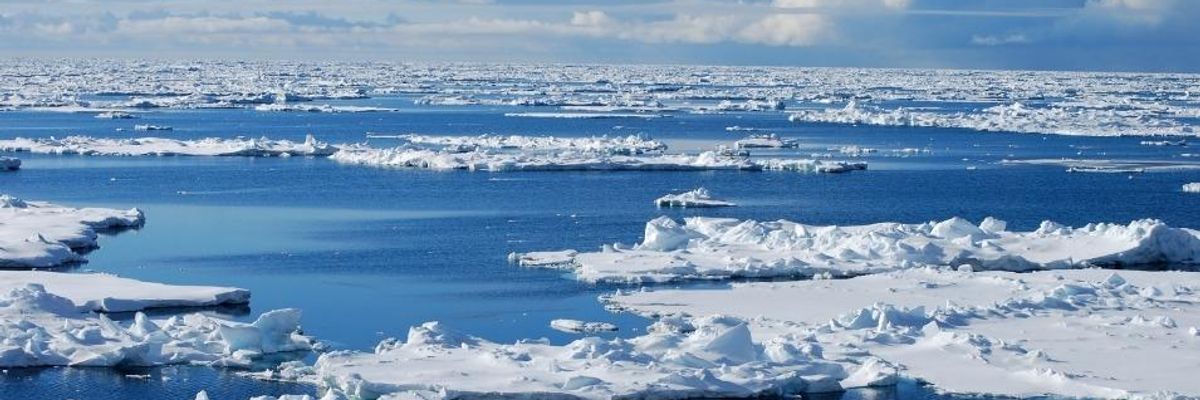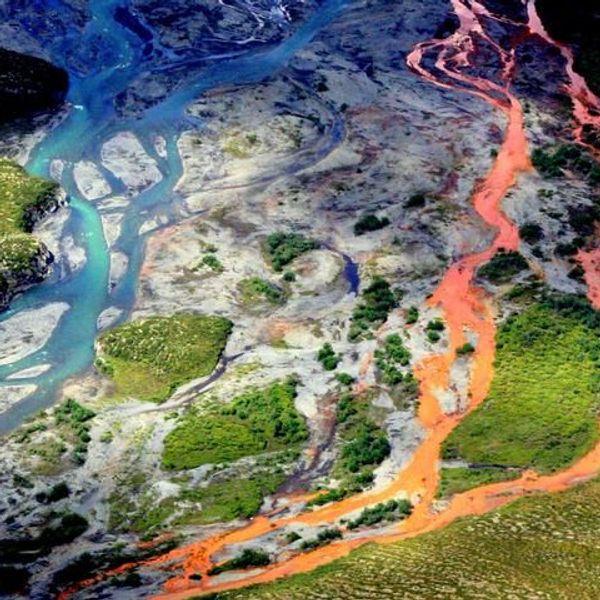
A new study by researchers at Leeds University found that ice sheets in Antarctica are thinning five times as quickly as in the 1990s. (Photo: Natalie Tapson/flickr/cc)
Thinning Five Times Faster Than Just Two Decades Ago, Study Shows Antarctic Ice Melting at Terrifying Rate
"The speed of drawing down ice from an ice sheet used to be spoken of in geological timescales, but that has now been replaced by people's lifetimes."
New research released Thursday revealed that ice sheets in Antarctica are thinning even more rapidly than scientists previously believed, with ice melting at five times the rate it did in the 1990s.
"Seems like humans are genuinely getting close to unlocking the "Make Earth Unlivable" achievement in their species career. Big come down from the moon landing." --Murtaza Mohammad Hussain, journalist
Some areas, researchers at Leeds University in the U.K. reported, are now about 328 feet (100 meters) thinner than they were less than three decades ago--putting the planet in danger of a major sea level rise which could wipe out coastal cities.
The study, published in Geophysical Research Letters, also detailed how scientists are accustomed to observing such changes in glaciers over geological time periods--not portions of people's lifetimes.
"From a standing start in the 1990s, thinning has spread inland progressively over the past 25 years--that is rapid in glaciological terms," lead author Andy Shepherd told The Guardian. "The speed of drawing down ice from an ice sheet used to be spoken of in geological timescales, but that has now been replaced by people's lifetimes."
The phenomenon was described by one observer as "the shallowing of deep time" on social media.
\u201c\u201cThe speed of drawing down ice from an ice sheet used to be spoken of in geological timescales, but that has now been replaced by people\u2019s lifetimes\u201d: new research published today on the thinning of Antarctic ice \u2013\u2013 and the shallowing of deep time. https://t.co/VlFTra2rRb\u201d— Robert Macfarlane (@Robert Macfarlane) 1558003891
Much of the ice loss is taking place in the West Antarctic ice sheet, a quarter of which is now considered "unstable" by scientists. The loss of the entire ice sheet would mean a global sea level rise of about 16 feet--wiping out coastal cities around the world.
"Seems like humans are genuinely getting close to unlocking the 'Make Earth Unlivable' achievement in their species career," wrote Intercept journalist Murtaza Mohammad Hussain in response to the research.
The study was completed by comparing weather data and hundreds of millions of satellite measurements taken between 1992 and 2017.
In Europe, ahead of Parliament elections in which voters across the continent will go to the polls later this month, members of the European Green Party pointed to the study as the latest evidence that voters should support candidates with concrete plans to combat the climate crisis by sharply reducing global reliance on fossil fuels and shifting toward renewable energy sources.
"We need urgent international policy to immediately address the ecological and climate emergency," tweeted Amelia Womack, deputy leader of the Green Party in Britain.
\u201cWe need urgent international policy to immediately address the ecological & climate emergency.\n\nElecting more Greens into the European Parliament is one of the best ways we can mitigate against these terrifying effects of a climate crisis.\n\n#VoteGreen2019\n\nhttps://t.co/98JhXbxlYF\u201d— Amelia Womack (@Amelia Womack) 1558002791
\u201cA reminder of what's at stake in these #EUElections2019- real #ClimateActionNow is what I, @saoirse_mchugh and @CiaranCuffe are campaigning for. It's not too late, yet #VoteGreenGetGreen\nhttps://t.co/7IQrKc42vh\u201d— Grace O'Sullivan MEP (@Grace O'Sullivan MEP) 1558028292
An Urgent Message From Our Co-Founder
Dear Common Dreams reader, The U.S. is on a fast track to authoritarianism like nothing I've ever seen. Meanwhile, corporate news outlets are utterly capitulating to Trump, twisting their coverage to avoid drawing his ire while lining up to stuff cash in his pockets. That's why I believe that Common Dreams is doing the best and most consequential reporting that we've ever done. Our small but mighty team is a progressive reporting powerhouse, covering the news every day that the corporate media never will. Our mission has always been simple: To inform. To inspire. And to ignite change for the common good. Now here's the key piece that I want all our readers to understand: None of this would be possible without your financial support. That's not just some fundraising cliche. It's the absolute and literal truth. We don't accept corporate advertising and never will. We don't have a paywall because we don't think people should be blocked from critical news based on their ability to pay. Everything we do is funded by the donations of readers like you. Will you donate now to help power the nonprofit, independent reporting of Common Dreams? Thank you for being a vital member of our community. Together, we can keep independent journalism alive when it’s needed most. - Craig Brown, Co-founder |
New research released Thursday revealed that ice sheets in Antarctica are thinning even more rapidly than scientists previously believed, with ice melting at five times the rate it did in the 1990s.
"Seems like humans are genuinely getting close to unlocking the "Make Earth Unlivable" achievement in their species career. Big come down from the moon landing." --Murtaza Mohammad Hussain, journalist
Some areas, researchers at Leeds University in the U.K. reported, are now about 328 feet (100 meters) thinner than they were less than three decades ago--putting the planet in danger of a major sea level rise which could wipe out coastal cities.
The study, published in Geophysical Research Letters, also detailed how scientists are accustomed to observing such changes in glaciers over geological time periods--not portions of people's lifetimes.
"From a standing start in the 1990s, thinning has spread inland progressively over the past 25 years--that is rapid in glaciological terms," lead author Andy Shepherd told The Guardian. "The speed of drawing down ice from an ice sheet used to be spoken of in geological timescales, but that has now been replaced by people's lifetimes."
The phenomenon was described by one observer as "the shallowing of deep time" on social media.
\u201c\u201cThe speed of drawing down ice from an ice sheet used to be spoken of in geological timescales, but that has now been replaced by people\u2019s lifetimes\u201d: new research published today on the thinning of Antarctic ice \u2013\u2013 and the shallowing of deep time. https://t.co/VlFTra2rRb\u201d— Robert Macfarlane (@Robert Macfarlane) 1558003891
Much of the ice loss is taking place in the West Antarctic ice sheet, a quarter of which is now considered "unstable" by scientists. The loss of the entire ice sheet would mean a global sea level rise of about 16 feet--wiping out coastal cities around the world.
"Seems like humans are genuinely getting close to unlocking the 'Make Earth Unlivable' achievement in their species career," wrote Intercept journalist Murtaza Mohammad Hussain in response to the research.
The study was completed by comparing weather data and hundreds of millions of satellite measurements taken between 1992 and 2017.
In Europe, ahead of Parliament elections in which voters across the continent will go to the polls later this month, members of the European Green Party pointed to the study as the latest evidence that voters should support candidates with concrete plans to combat the climate crisis by sharply reducing global reliance on fossil fuels and shifting toward renewable energy sources.
"We need urgent international policy to immediately address the ecological and climate emergency," tweeted Amelia Womack, deputy leader of the Green Party in Britain.
\u201cWe need urgent international policy to immediately address the ecological & climate emergency.\n\nElecting more Greens into the European Parliament is one of the best ways we can mitigate against these terrifying effects of a climate crisis.\n\n#VoteGreen2019\n\nhttps://t.co/98JhXbxlYF\u201d— Amelia Womack (@Amelia Womack) 1558002791
\u201cA reminder of what's at stake in these #EUElections2019- real #ClimateActionNow is what I, @saoirse_mchugh and @CiaranCuffe are campaigning for. It's not too late, yet #VoteGreenGetGreen\nhttps://t.co/7IQrKc42vh\u201d— Grace O'Sullivan MEP (@Grace O'Sullivan MEP) 1558028292
New research released Thursday revealed that ice sheets in Antarctica are thinning even more rapidly than scientists previously believed, with ice melting at five times the rate it did in the 1990s.
"Seems like humans are genuinely getting close to unlocking the "Make Earth Unlivable" achievement in their species career. Big come down from the moon landing." --Murtaza Mohammad Hussain, journalist
Some areas, researchers at Leeds University in the U.K. reported, are now about 328 feet (100 meters) thinner than they were less than three decades ago--putting the planet in danger of a major sea level rise which could wipe out coastal cities.
The study, published in Geophysical Research Letters, also detailed how scientists are accustomed to observing such changes in glaciers over geological time periods--not portions of people's lifetimes.
"From a standing start in the 1990s, thinning has spread inland progressively over the past 25 years--that is rapid in glaciological terms," lead author Andy Shepherd told The Guardian. "The speed of drawing down ice from an ice sheet used to be spoken of in geological timescales, but that has now been replaced by people's lifetimes."
The phenomenon was described by one observer as "the shallowing of deep time" on social media.
\u201c\u201cThe speed of drawing down ice from an ice sheet used to be spoken of in geological timescales, but that has now been replaced by people\u2019s lifetimes\u201d: new research published today on the thinning of Antarctic ice \u2013\u2013 and the shallowing of deep time. https://t.co/VlFTra2rRb\u201d— Robert Macfarlane (@Robert Macfarlane) 1558003891
Much of the ice loss is taking place in the West Antarctic ice sheet, a quarter of which is now considered "unstable" by scientists. The loss of the entire ice sheet would mean a global sea level rise of about 16 feet--wiping out coastal cities around the world.
"Seems like humans are genuinely getting close to unlocking the 'Make Earth Unlivable' achievement in their species career," wrote Intercept journalist Murtaza Mohammad Hussain in response to the research.
The study was completed by comparing weather data and hundreds of millions of satellite measurements taken between 1992 and 2017.
In Europe, ahead of Parliament elections in which voters across the continent will go to the polls later this month, members of the European Green Party pointed to the study as the latest evidence that voters should support candidates with concrete plans to combat the climate crisis by sharply reducing global reliance on fossil fuels and shifting toward renewable energy sources.
"We need urgent international policy to immediately address the ecological and climate emergency," tweeted Amelia Womack, deputy leader of the Green Party in Britain.
\u201cWe need urgent international policy to immediately address the ecological & climate emergency.\n\nElecting more Greens into the European Parliament is one of the best ways we can mitigate against these terrifying effects of a climate crisis.\n\n#VoteGreen2019\n\nhttps://t.co/98JhXbxlYF\u201d— Amelia Womack (@Amelia Womack) 1558002791
\u201cA reminder of what's at stake in these #EUElections2019- real #ClimateActionNow is what I, @saoirse_mchugh and @CiaranCuffe are campaigning for. It's not too late, yet #VoteGreenGetGreen\nhttps://t.co/7IQrKc42vh\u201d— Grace O'Sullivan MEP (@Grace O'Sullivan MEP) 1558028292

